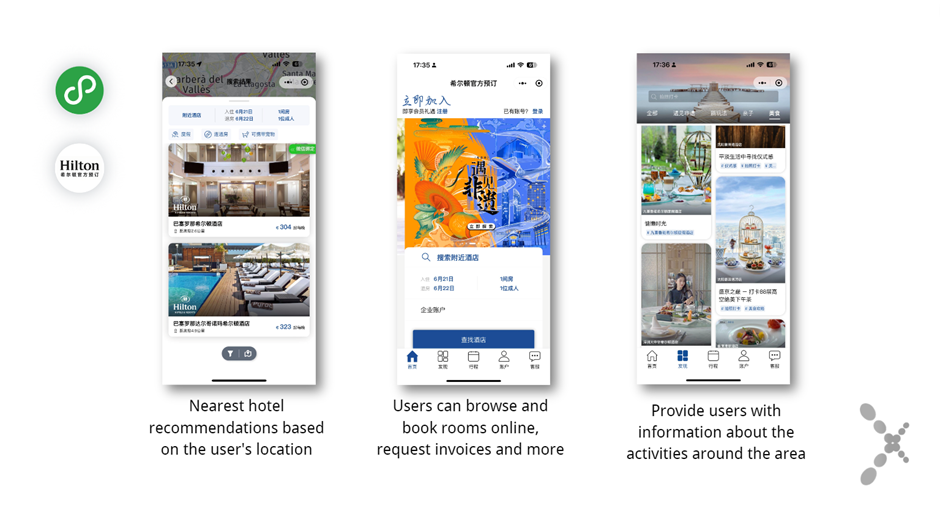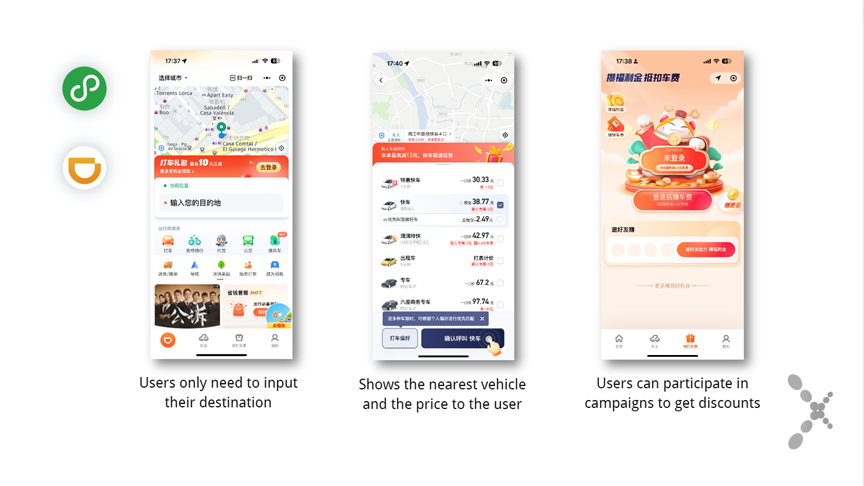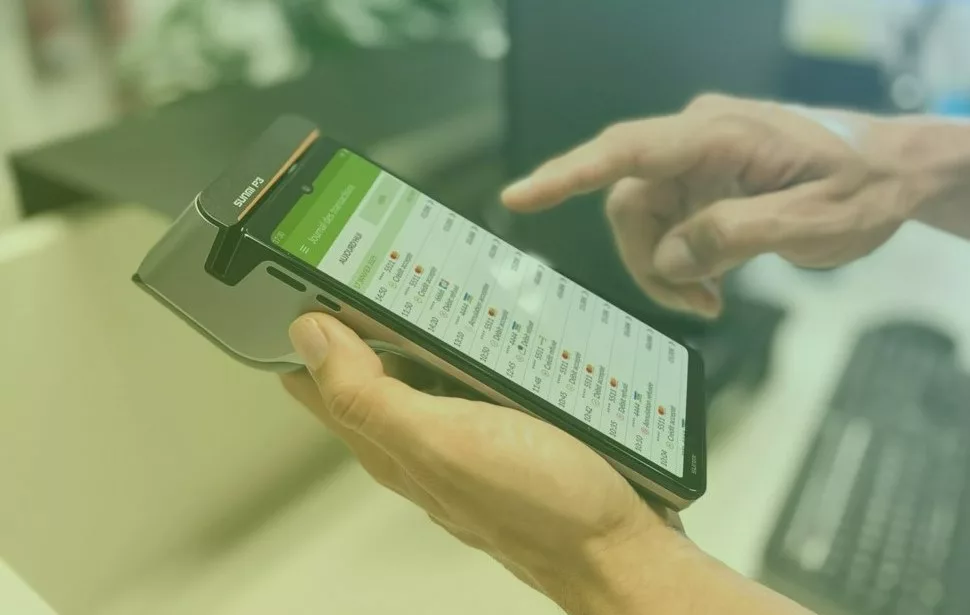You might be familiar with the SuperApp WeChat developed by China’s tech giant Tencent. In 2017 Tencent launched the WeChat mini-programs, which are cloud-based, embedded apps within the WeChat ecosystem, in other words, these are“sub-applications” that operate within the WeChat app.
How do Mini-Programs Work?
Developers can quickly develop a mini-program to provide users with various range of services such as inquiries, reservations, purchases, games, and more. Users can directly use these services within the WeChat app without downloading additional applications, thus creating a smoother and faster user experience.
Additionally, it can quickly spread within the WeChat ecosystem, providing users with an excellent user experience. As of 2024, there are over 5 million mini-programs on WeChat with 949 million daily active users, which means over 90 percent of the WeChat users are using the services, and 98% of Chinese companies have their own mini-programs within the app. (Source: Statista.com)
The travel industry is primarily service-oriented, and adopting mini-programs has become increasingly popular among brands aiming to enhance customer experiences and streamline operational efficiency. By leveraging mini-programs, travel businesses can offer more personalised services, improve booking processes, and manage customer interactions more effectively, leading to greater overall satisfaction and operational success.
How Hotels Use Mini-Programs for Promotions
Take the renowned international hotel chain Hilton as an example. Hilton Hotels has designed the mini program with not only the intelligence part but also the localised services in mind.
The mini-program allows customers to view hotel details in various cities and incorporates a convenient invoice application function. Customers can easily fill in relevant information on their mobile phones and collect their invoices directly at the front desk. Leveraging the WeChat ecosystem to connect with customers, Hilton offers two dedicated sections, “Food and Drink” and “Entertainment,” to help guests explore local cuisines, attractions, travel routes, and other helpful information.
In addition, Hilton Hotels leverages the mini program to enhance user engagement through games and membership benefits. Users can participate in activities and enjoy relevant discounts through WeChat. Moreover, the mini program is integrated with Hilton’s backend system, automatically applying discounts during the payment process for a smooth and efficient checkout experience.

Benefits of Using the WeChat Mini-Program in the Hotel Industry:
1. Simplified booking and check-in experience with improved service intelligence level.
The hotel’s mini program offers customers a seamless booking and check-in experience for hotel guests. Consumers can browse different room types, choose check-in time, check-out time, etc., and place the booking order, managing the order directly via the mini-program. In some cases, then obtain the e-key for the room and complete the check-in/check-out without visiting the front desk, which simplifies the guest experience and enhances the overall intelligence and efficiency of hotel services.
2. Personalised and improved services.
Mini programs collect and analyse customer data based on preferences and past order records to provide personalised services. Through this data-driven approach, hotels not only gain deeper insight into their customers but also better target and refine services based on user reviews and preferences.
Additionally, hotel mini-programs can integrate diverse package services such as room service, restaurants, spas, and taxis, collaborating with local businesses to offer special discounts and promotions within a single platform. All of these can significantly enhance the guest experience and satisfaction while the realise the digitalised operation of the hotel.
3. Enhances brand exposure and loyalty.
Since the mini-program is built within the WeChat app ecosystem, it helps hotels gain brand exposure from the vast user base that WeChat has. Moreover, it provides a smooth social entrance with word-of-mouth sharing and marketing fission where hotels can win potential customers with high reach efficiency and retain existing customers by providing promotions, advertisements, and event information that users can promptly access.
If users are interested in marketing information, they can share it with one click on WeChat with their friends and family, further increasing the hotel’s exposure and establishing border connections with customers while building an exclusive direct sales channel, which does not affect other existing sales channels on the premise. This reduces reliance on intermediaries, increasing profit margins while simultaneously building customer loyalty.
4. Improves management efficiency and conversation rate with reduced operation cost:
Mini-programs streamline various hotel operations, including booking, payment, and order management, by moving them online. This alleviates the workload of front desk staff and ensures easy management while improving management efficiency and accuracy. In addition, the mini-program supports intelligent customer service, membership management and an online Q&A system, allowing customers to get timely answers and convert more orders.
The mini-program can also assist hotel backend management by providing real-time feedback on room conditions, check-out time, cleaning progress, etc., reducing the hotel’s operational costs and maintaining high service standards.
How the Taxi-App Didi uses a mini-program
Let’s look at the mini-program of one of China’s biggest taxi apps, Didi. It allows users to directly access their ride-hailing services from the WeChat app they use daily. Users simply enter their destination to find nearby vehicles, estimated waiting times and prices. Users can also choose their preferred vehicle to suit their individual needs.
Didi also integrated other functions to provide additional services such as designated drivers, navigation, and information on nearby petrol stations with current fuel prices. This makes Didi’s mini-program a versatile transportation tool for users. Didi also offers regular promotional discounts, where users can participate in events or invite friends to receive vouchers and coupons, enhancing user engagement and loyalty.

Advantages of mini-programs to the European taxi brand:
1. Seamless experience for the Chinese traveller.
According to Alipay’s “Chinese outbound travel taxi consumption survey”, the main challenges faced by Chinese travellers abroad include Language barriers & confusion (37%), Concerns about being detoured in foreign countries 34%), Hassles of downloading local taxi apps (19%) and Payment troubles (15%). By offering a mini program, European taxi brands can address these concerns directly.
The Taxi mini-program operates within a familiar Chinese Interface and often includes a built-in Chinese interpreter to communicate with the driver. Users can easily enter a mini-program without downloading a separate app, receive real-time updates on the route, and also pay via WeChat Pay and view the bill on WeChat. This all-in-one solution significantly reduces the common worries associated with travelling abroad.
2. Efficient ride-hailing:
Mini programs allow consumers to book taxi services directly within the WeChat app, offering a quick and convenient experience. Users can access the taxi mini-program within seconds by searching on WeChat or scanning the mini-program QR code displayed at key locations such as airports, hotels, or taxes, making the experience efficient and pleasant.
3. Convenient and fast payment:
As mini-programs are integrated with WeChat Pay, users can make payments with WeChat Pay seamlessly after using the ride-hailing service. Users can even authorise to automatically deduct payments after using the service, eliminating the need for additional payment steps. Making payment quick and hassle-free.
4. Personalised services and discounts to improve user stickiness:
Mini programs can analyse users’ data and habits to enhance the overall user experience. Additionally, mini-programs offer customised promotions or coupons based on user preferences, encouraging customers to book rides more frequently via mini-programs and increasing customer satisfaction and loyalty.
Why European and UK Merchants Should Utilise Mini-Programs
1. Better reach to Chinese consumers with lower acquisition cost
WeChat is China’s most popular social app. By developing WeChat mini-programs, merchants can reach a vast user base of over 1.3 billion on WeChat, making SuperApp users your own potential users and enhancing brand recognition, especially in the Chinese market. Easy access to users also helps brands achieve lower customer acquisition costs.
2. Saves development time and cost.
Mini-programs are based on Tencent’s development framework and API, and their technical development requirements and development cycle are lower than those of traditional apps. And mini-programs are compatible with all platforms, unlike traditional apps that need separate development for both iOS and Android versions. In addition, mini-programs can be released directly online, yet apps need to be released by various manufacturers.
3. Provide better user experience
Outbound travel is not a high-frequency activity, and downloading seperate apps is troublesome, especially in a foreign country. Those apps require additional actions, consume data and take up valuable storage space on mobile phones.
Customers also worry about issues like credit card rejection or lack of cash. Mini programs can be accessed in seconds on the WeChat app and are integrated with Chinese consumers’ familiar and preferred mobile payment method, providing a smoother and more pleasant user experience.
4. Better conversation rate with a variety of marketing functions.
Mini programs leverage the social attributes of WeChat, driving user engagement and expanding reach. Users can easily share mini-programs with family and friends through WeChat moments, or being redirected from the WeChat Official Account, enabling social sharing and the effect of marketing fission.
Moreover, mini-programs support various marketing functions, such as flash sales, members-only promotions, etc., making it easy for merchants to promote campaigns and improve sales conversion rates and customer loyalty.
5. Quick and easy traffic generation:
Merchants can efficiently drive both online and offline traffic using mini -programs. By placing mini-program QR code stickers at tourist attractions, travel agencies, hotel lobbies, car rental agencies, etc., travellers can simply scan the code to learn about a brand and its goods and services through mini-programs. This strategy effectively converts offline foot traffic into online engagement.
Furthermore, merchants can attract and encourage customers to make reservations and bookings through online promotions via mini-programs, bringing online traffic to offline stores.
WeChat mini-programs provide a powerful tool for enhancing your brand’s presence in the Chinese market by reducing acquisition costs, simplifying development, and offering seamless user experiences. They streamline payments, boost engagement through personalised services and promotions, and drive both online and offline traffic with strategic QR code placements.
Contact us today to develop a customised mini -program strategy that elevates your brand visibility and drives growth in the Chinese market.




